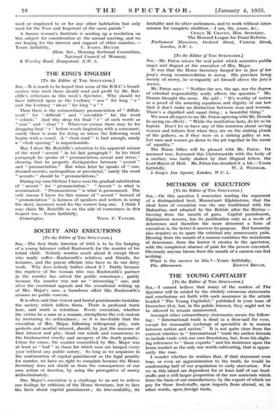SOCIETY AND EXECUTIONS [To the Editor of THE SPECTATOR.]
Sia,—The first State function of 1935 is to be the hanging of a young labourer called Rushworth for the murder of his infant child. Nobody worries much about it except those who really suffer—Rushworth's relatives and friends, for instance, and the prison officials who have to do our dirty work. Why does nobody bother about it ? Partly because the reprieve of the woman who was Rushworth's partner in the murder has salved the public conscience ; partly because the murder was not an " interesting " one, and after the emotional appeals and the sensational writing up of Mrs. Major's case, a humdrum affair like Rushworth's arouses no public concern.
It is often said that violent and brutal punishments brutalize the society which inflicts them. There is profound truth here, and truth is relentless. Every execution, whether the victim be a man or a woman, strengthens the evil custom by increasing its ordinariness ; so it is inevitable that the execution of Mrs. Major, following widespread pity, vain protests and morbid interest, should, by just the measure of that interest and pity, blunt our minds and consciences to the fundamental cruelty and savagery of the death penalty. Crime for crime, the murder committed by Mrs. Major was at least as bad " as those for which men are hanged every year without any public outcry. So long as we acquiesce in the continuation of capital punishment as the legal penalty for murder, we have no right to complain because the Home Secretary does not shield us from the consequences of our own action or inaction, by using the prerogative of mercy indiscriminately.
Mrs. Major's execution is a challenge to us not to relieve our feelings by criticism of the Home Secretary, but to face the facts about capital punishment ; its irrevocability, its






































 Previous page
Previous page